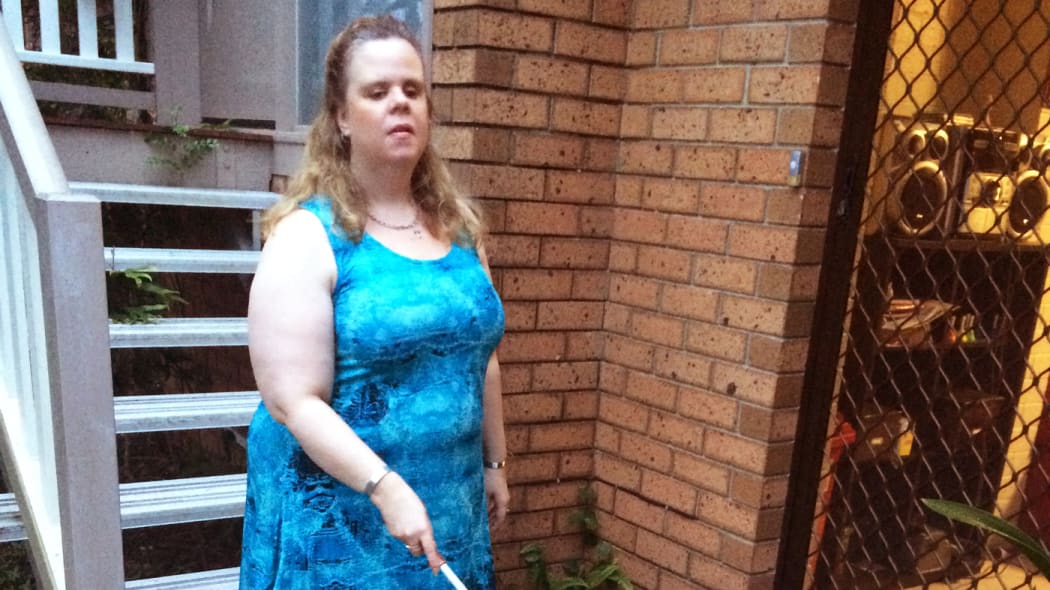Julee-anne Bell has never perceived light. The Brisbane singing teacher used to be afraid to venture out alone, but after learning echolation – a way of navigating using sound – she can now move through the world with confidence.

Julee-anne Bell Photo: supplied
Bell is working to enable more visually impaired Australians to learn the skill.
Bell was born with the eye disorder Leber congenital amaurosis, which essentially means her retinas don't work.
In the summertime of 2010, the self-confessed "medical TV junkie" was lying on her bed channel-surfing when her ears perked up at the word 'Retinoblastoma'.
An American boy who'd had both his eyes removed as the result of the rare cancer, was clicking his tongue to navigate his environment.
The boy's instructor Daniel Kish (who'd experienced the same thing) was teaching visually impaired people around the world a navigation technique called FlashSonar.
"I remember sitting up very straight and my heart was racing. It was like a real light bulb moment."
She emailed Kish and they set up a Skype date. A year later, he came to Australia to work with Bell and other visually impaired Queenslanders.
The first thing Kish did was substitute Bell's old cane (which reached her sternum) for a lighter and longer one which reaches the tip of her nose.
The longer reach of the cane gave her 'more preview', and as soon as she took her first steps with it she felt safer.
"I always ask people, if you have a choice of finding out there's a cliff in front of you would you like to know one step away or would you like to know five steps away?"
The next step was learning to click and identify objects based on their echo.
"It's almost like learning a language that you might have heard somewhere before. For me, it was as though this was always kind of there in the background."
Effectively, Kish gave her permission to listen to her perceptual system more deeply than ever before and use it to gain information, she says.
Being blind does give you an advantage in this area, she says. Sighted mobility specialists can't detect echoes with the same detail as blind people because vision seems to override the other senses.
"Vision is so much your primary sense and it's very difficult for you to not use your vision."
There are few different clicks that can be used for echolocation – Bell makes hers with the tip of her tongue on her hard palate, just behind her front teeth.
The 'tssk-tssk' click people make to show disapproval (perhaps the one most people are accustomed to) won't get you far, she says.
"That's not a very good click 'cause it's very sloppy and not very sharp."
Learning the language of echoes is largely about learning to differentiate solid sounds from sparse sounds, i.e. the density of a brick wall produces quite a different echo to light foliage.
Detecting something solid which has gaps in it – such as a shopping trolley – takes some skill.
Mostly, echolocation works with objects that are at minimum head-height, but out on the street you're most often seeking out the clear space to walk through rather than obstacles themselves anyway, Bell says.
While she'd had great mobility training in the past, it didn't help her crippling fear of getting lost.
In traditional orientation (known as 'route learning') you are taught to get from Point A to Point B and discouraged from deviation, she says.
Echolocation skills have given her spatial confidence she couldn't have imagined before.
"I always felt as though I was walking along a very thin imaginary line – and I had to stay on that line. And if I went off that line I was almost in no man's land. Whereas with FlashSonar, the route isn't as important as how does the whole space sound.
"If you're a bit confused you can stop, you can click and you go can go, 'Right. That's the shoreline, that's where the shops are.' And you can head over and regroup."
"For most people, as soon as they have a bit more control over a situation that anxiety decreases, and that was certainly the case for me."
Julee-anne Bell is the managing director charity World Access for the Blind Australia, which has the long-term goal of training FlashSonar instructors who can then provide training to visually impaired Australians.

